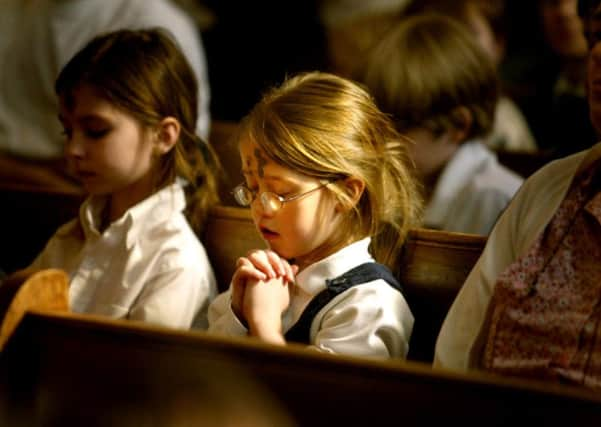Leader comment: Teens should be able to opt-out of school religion


Until now it has been a matter for each parent to decide whether to withdraw their child from religious activities if it conflicts with their beliefs.
The Humanist Society of Scotland (HSS) is now seeking a judicial review of the Scottish Government’s policy not to allow 16 to 18-year-olds to make the decision for themselves.
Advertisement
Hide AdAdvertisement
Hide AdSchools are advised by the Scottish Government to offer at least six occasions of religious observance a year, while the parental opt-out right is enshrined in law.
However in England and Wales, sixth formers have the right to make their own choice about whether to opt out or not, without needing permission from their parents.
The United Nations first raised the prospect of sixth formers opting out of religious observance earlier this year, as part of a report on the rights of child.
It highlighted Scotland’s case and suggested laws around compulsory attendance of religious activities were ripped up.
The Scottish Government ruled out reviewing its policy, pointing out that religious education was an important part of the curriculum and that the status quo offers enough freedom of choice.
The legal challenge from the HSS hinges on the fact that it could be “unlawful” to deny Scottish teenagers the same right to choice as their peers south of the Border. Setting aside the issue of what the right place for religion in schools is, the fact that older teenagers cannot make the decision for themselves is surely misguided.
At 16, young people can get married, join the forces or vote in Scottish Parliamentary elections, and work and pay taxes.
These are important decisions both personally and for society as a whole, demonstrating that the state clearly believes that young people are responsible enough to make their own choices.
Advertisement
Hide AdAdvertisement
Hide AdYet the arguably vital opportunity to follow their own conscience is denied to them and hypocrisy may be thrust upon them.
It is hard to see the arguments for preventing them from making that choice, especially if they are considered adult enough in mnay other areas – a particluar drive of this Scottish Government.
In fact, it flies in the face of basic common sense. Why should deciding their religious views be anomalous?
Religion may still have a role to play in the schoolroom, and many schools might use that time as an opportunity for reflection on moral and ethical issues and for broader debates
That may not be something everyone wants to be a part of and it is right that parents can make these decisions on behalf of their young children. However this could be a chance for the Scottish Government to be truly progressive in its attitudes and to show the younger generation that their beliefs are valued and worthy of respect.
Remedy for medical cannabis
The benefits of medical cannabis use are growing harder to ignore.
Calls will be made today by a Westminster cross-party group of eminent scientists and MPs for the legalisation of the class B drug for people with conditions such as multiple sclerosis and cancer.
More than a million people in the UK are thought to be using cannabis to self medicate, although the drug remains illegal.
Advertisement
Hide AdAdvertisement
Hide AdWhile debate around general legalisation of drugs is complex, the case for reform for medical reasons seems far more clear cut.
Today’s report by respected neurologist Professor Mike Barnes concludes that medical cannabis can alleviate the symptoms of chronic pain and spasticity – often associated with multiple sclerosis, nausea and vomiting, particularly for those people undergoing chemotherapy. If there was another medicine proven to work and to provide such relief, then it would certainly be licensed for use.
Morphine is regularly used for its painkilling properties, despite the opiate’s similarity to heroin.
It makes far more sense to remove cannabis from the shady clutches of drug dealers and reframe its use medically, where it can be regulated and targeted to help people.
The decision presents a political problem for the UK government but they must use their courage to view the issue as separate to recreational drug use.
Earlier this year, a survey found that more than half of MPs supported the use of medical cannabis, including former deputy prime minister Nick Clegg.
Now is the time for our politicians to put those words into action.